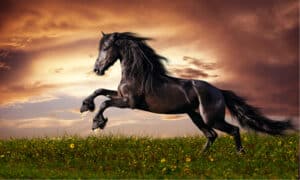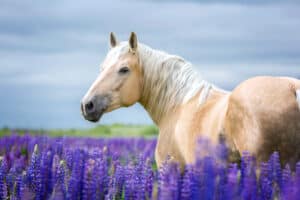Donkeys and horses are two of the most famous work animals in the history of the world. Horses have carried soldiers into battle and acted as a means of peaceful conveyance for millennia. Donkeys have been used as pack animals and cart pullers for thousands of years as well. Today, they continue in these roles and have grown into others. Although donkeys and horses are both herbivorous quadrupeds with roughly the same body shape, many differences exist between a donkey vs horse.
We’re going to offer some simple and complex differences between these animals. Not only will you recognize each one, but you will learn why they were each adapted into their old and new purposes.
Comparing a Donkey and a Horse

| Donkey | Horse | |
| Size | Weight: 400-570lbs Height: 35in-51in at the shoulder | Weight: 840-1,200lbs Height: 55in to 67in at the shoulder, with some larger horses recorded |
| Speed | – 15 mph | – 25- 40 mph on average – 55 mph highest measured |
| Lifespan | – 15-30 years | – 25-30 years |
| Social Behavior | – Bond with one other creature and live in pairs – Can live with a herd | – Herd animals that will live with larger groups. |
| Genetics | 64 chromosomes | 62 chromosomes |
| Behavior | Less flighty, will stand and fight against enemies | Skittish and will run from threats |
| Ear Length | – Large ears that can flop downward. | – Short ears that often remain upright |
The Key Differences Between Donkey vs Horse
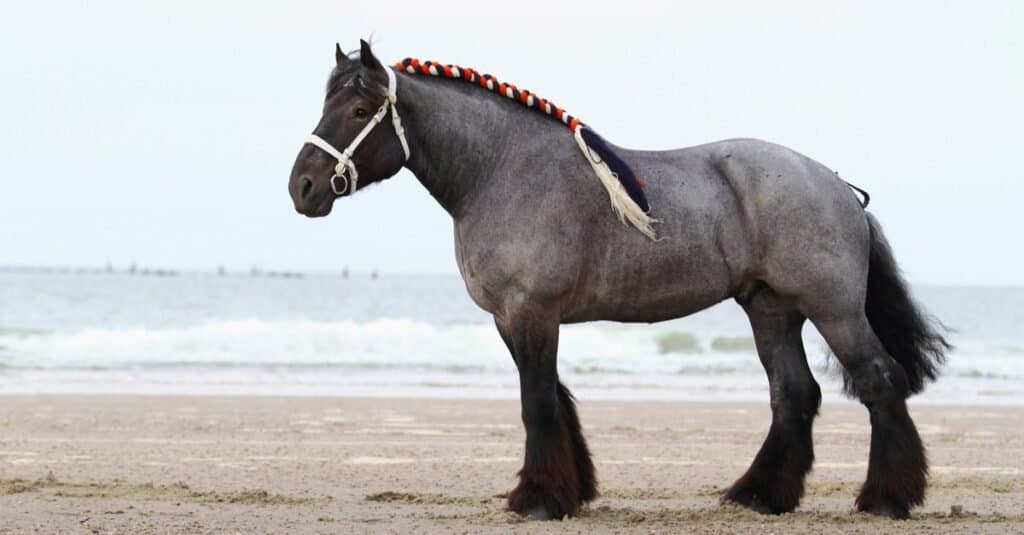
Horses and donkeys have many differences in their bodies.
©navatu/Shutterstock.com
The main differences between donkeys and horses are their size, speed, and social behaviors. Donkeys are smaller than horses, standing several inches to several feet shorter than them and weighing about half as much as a horse.
Another major difference between the two animals is their speed. Horses are much faster than donkeys. Donkeys can run along at a respectable 15 mph, but horses are bred for speed and endurance and can reach 30 mph easily and 55 mph at their utmost.
Lastly, horses are herd animals that thrive in a social climate, but donkeys mostly live in pairs in the wild rather than a large crowd.
These differences define these mammals and make it easy to identify each of them. However, we’re going to explore other differences between these creatures to plumb the depths of their uniqueness.
Donkey vs Horse: Size
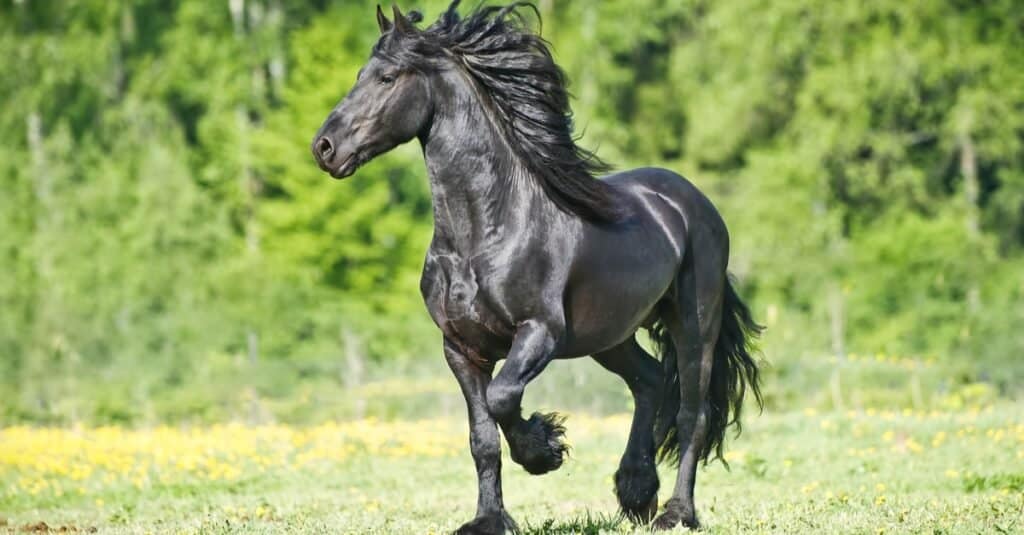
Horses are larger and heavier than donkeys
©olgaru79/Shutterstock.com
Donkeys are smaller than horses. The average donkey will stand between 35 inches tall and 51 inches tall at the shoulder, and they weigh between 400lbs and 570lbs. Horses are much taller and heavier. They can stand up to 67in at the shoulder and weigh up to 1,200lbs or more.
If you placed an average donkey next to an average horse, the size difference would be immediately perceptible.
Donkey vs Horse: Speed
Donkeys are slower than horses. Donkeys can achieve a running speed of 15 mph, and that is not too much when you consider that some humans can outpace them for a short distance. Horses have been bred for speed and endurance for thousands of years.
The average horse will run between 25 mph and 40 mph, but the fastest horse on record ran at 55 mph. Both Quarter Horses and Thoroughbreds are specifically bred for speed, for example. That means that the fastest horses are nearly four times faster than the average donkey!
Donkey vs Horse: Lifespan
Horses live longer than donkeys on average. Donkeys can live between 15 and 30 years depending on a lot of factors. Although many donkeys are cared for by owners in farmlands, rigorous work will take its toll on these creatures and lower the amount of time they live. When cared for well, donkeys can live for up to 30 years.
Horses will live between 25 and 30 years. Those that live in the wild are not as likely to see 30 years of age as those in captivity, though. Many horses throughout the world are cared for as pets and show animals, and they tend to live the longest due to the time and money investment they represent.
Donkey vs Horse: Social Behavior
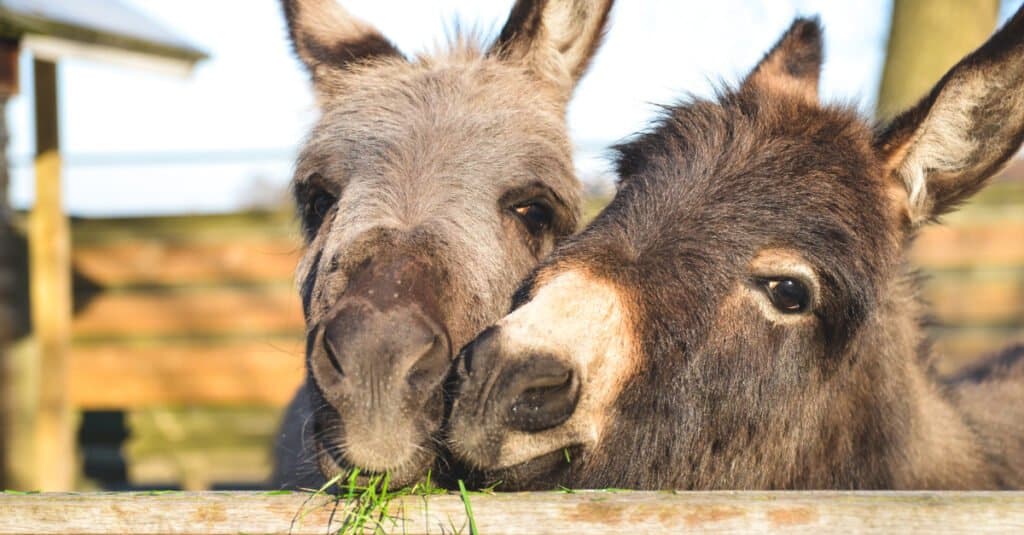
Donkeys tend to bond with one other donkey instead of living in large herds.
©babeaudufraing/Shutterstock.com
Donkeys tend to live in pairs and bond with other donkeys, but horses live in large herds when they’re in the wild. That doesn’t mean that donkeys won’t interact with other animals, though. They often do well with other livestock when they’re acclimated to one another at a young age. That way, the donkey is used to getting along with the other creatures.
Horses do well in herds with familiar horses. They might not blend well with other animals or horses that they’re not used to seeing.
Donkey vs Horse: Genetics
Although it’s not a visible difference, horses and donkeys have different numbers of chromosomes. Horses possess 64 chromosomes and donkeys possess 62 chromosomes. Mules, the offspring of a horse and donkey, have 63 chromosomes.
Donkey vs Horse: Behavior
Donkeys are brave animals that will stand their ground and fight against foes, but horses are more skittish and will often flee from confrontations if they can. Horses are fast animals, so any discomfort will likely make them run away because that’s their best bet for survival.
Donkeys are not very fast compared to predators, so they stand and fight for their lives. They’ll bite and kick animals, and they can fend off tough predators like coyotes. Interestingly, donkeys have been integrated into other livestock herds for that very reason; they’ll defend their territory from coyotes and other predators, thereby protecting flocks of sheep and other creatures.
Of course, they need to be acclimated to the other animals beforehand, or those farm animals might end up getting bitten or kicked themselves.
Donkey vs Horse: Ear Length
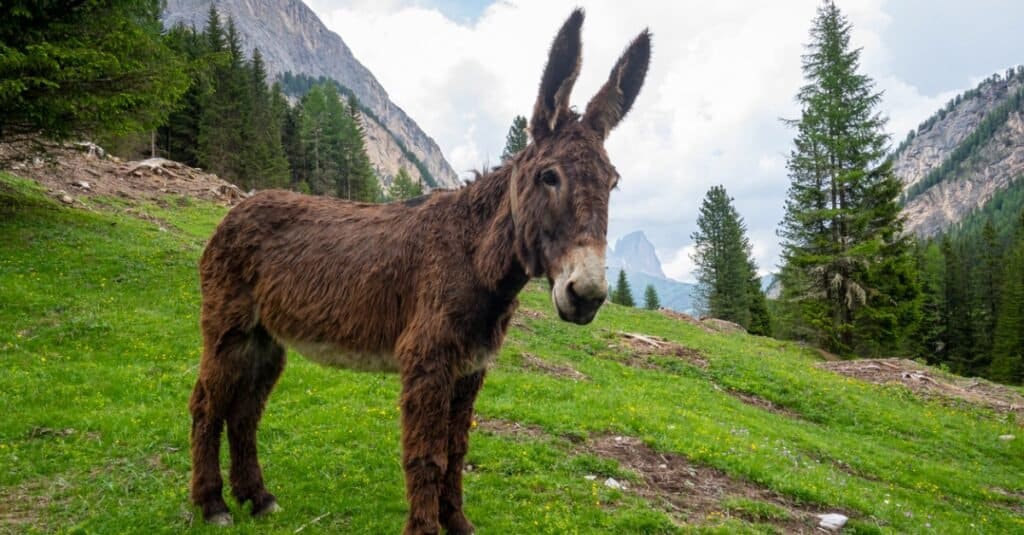
Donkey’s ears are much larger than a horse’s ears.
©iStock.com/Jacek Jacobi
Lastly, donkeys have longer ears than horses. Donkeys’ ears are very long, and that means they often flop down to the sides of the animal’s head rather than standing straight up. Horse ears are shorter and more alert. They will never flop down to the side because of their small size.
Donkeys and horses have many differences. Some of them are obvious like size, ear length, and speed, but others require getting to know the animals before they become obvious. For example, donkeys might be slower and smaller than a horse, but they’re braver.
All in all, donkeys and horses continue to be two of the most useful animals in terms of their relationships with humans.
The photo featured at the top of this post is © vvvita/Shutterstock.com
Thank you for reading! Have some feedback for us? Contact the AZ Animals editorial team.




